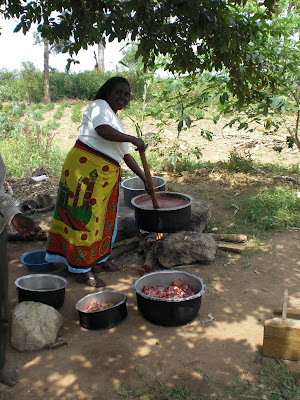
“What an incredible story,” I said to myself, listening to a man nervously speaking in front of the packed village church. I could tell he wasn’t used to being in front of so many people, let alone telling about what had happened to him.
Diana Hill and I had been asked to attend this new church on our second day in Uganda. It was a long 2-hour drive over rough roads through incredibly beautiful scenery not far from Lake Victoria. When we got there the women set up their chairs under a big tree, about 80 of them, where I taught on marriage. The dozens of children went with Diana into a small porch and the men stayed inside the sanctuary. After an hour or so we all gathered inside the church.
The program began with a small band playing, several choirs singing and often the congregation joining in. Although there was no electricity in the building, a battery-powered PA system blared out through microphones, even though we could have easily heard everyone without it.
During the service several women went around to each person with cups of tea and plates of rolls. I realized that this was the first food most of them had eaten that day.
Then the testimonies began. The interpreter’s English wasn’t very good, so it was hard to understand everything that was being said. But when William began to speak, I could sense a change in the congregation. They were listening intently, with several shouts of “Praise the Lord” and bursts of applause.

William was a moon shiner. He had a still for making whiskey in one of the rooms of his tiny shack He was very poor, his wife and three children were suffering. So he went to the local witchdoctor to get help. There he spent food money for fetishes to put around his house: pieces of bone, feathers, leather straps, pieces of paper with strange words on them, and various other items that were supposed to give him power to succeed.
One evening a neighbor came to his home and asked him to go with him to a rally at the church. He didn’t want to go, but he heard they were giving out mosquito nets and mattresses—neither of which he owned. So he went.
He told how the message of God’s love, forgiveness and grace touched his heart, and he responded to the call to give up trying to control his own life and give it to God, receiving the forgiveness that Jesus offers and the love he experienced from the people around him.
After the service we were invited to accompany the pastors to his home, where he wanted to destroy all the fetishes and have his home blessed. Diana and I were a little nervous, as we didn’t know what to expect. We arrived first at the neighbor’s house, where we saw several pig pens. Diana leaned over to me and whispered, “Tell me there won’t be demons entering these pigs!”
Joseph then went to his crude hut, gathered up all the fetishes hiding throughout the rooms—some stuck over the doorway—and piled them up outside. Kerosene was poured on the heap, and after some prayers and scripture reading, the flames destroyed the items Joseph had been depending upon, while we all sang “Amazing Grace” in different languages.
I received an email today saying Joseph is a changed man. He has cleaned himself up, as well as his house. He has brought his wife and children to church, and now has a good paying job doing construction with one of the church members. He wants to be a good father and husband,

